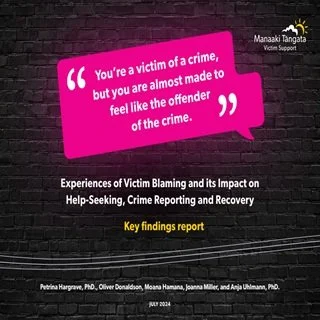By Petrina Hargrave, PhD., Oliver Donaldson, Moana Hamana, Joanna Miller, and Anja Uhlmann
Victim blaming, where crime victims are held responsible for their victimisation, deflects blame from perpetrators. This may discourage victims from seeking help or reporting crime, a significant issue in New Zealand where only 28% of crime is reported. It may also impede their recovery. Preventing victim blaming requires understanding victims’ experiences, especially among Māori, Rainbow, and disabled communities, who face higher crime rates. This research aims to raise awareness of victim blaming and its impact on help-seeking, crime reporting and recovery. Victim Support interviewed 31 New Zealand crime victims who had experienced victim blaming, uncovering five key themes.
New Zealand: Manaaki Tāngata Victim Support , 2024. 40p.




